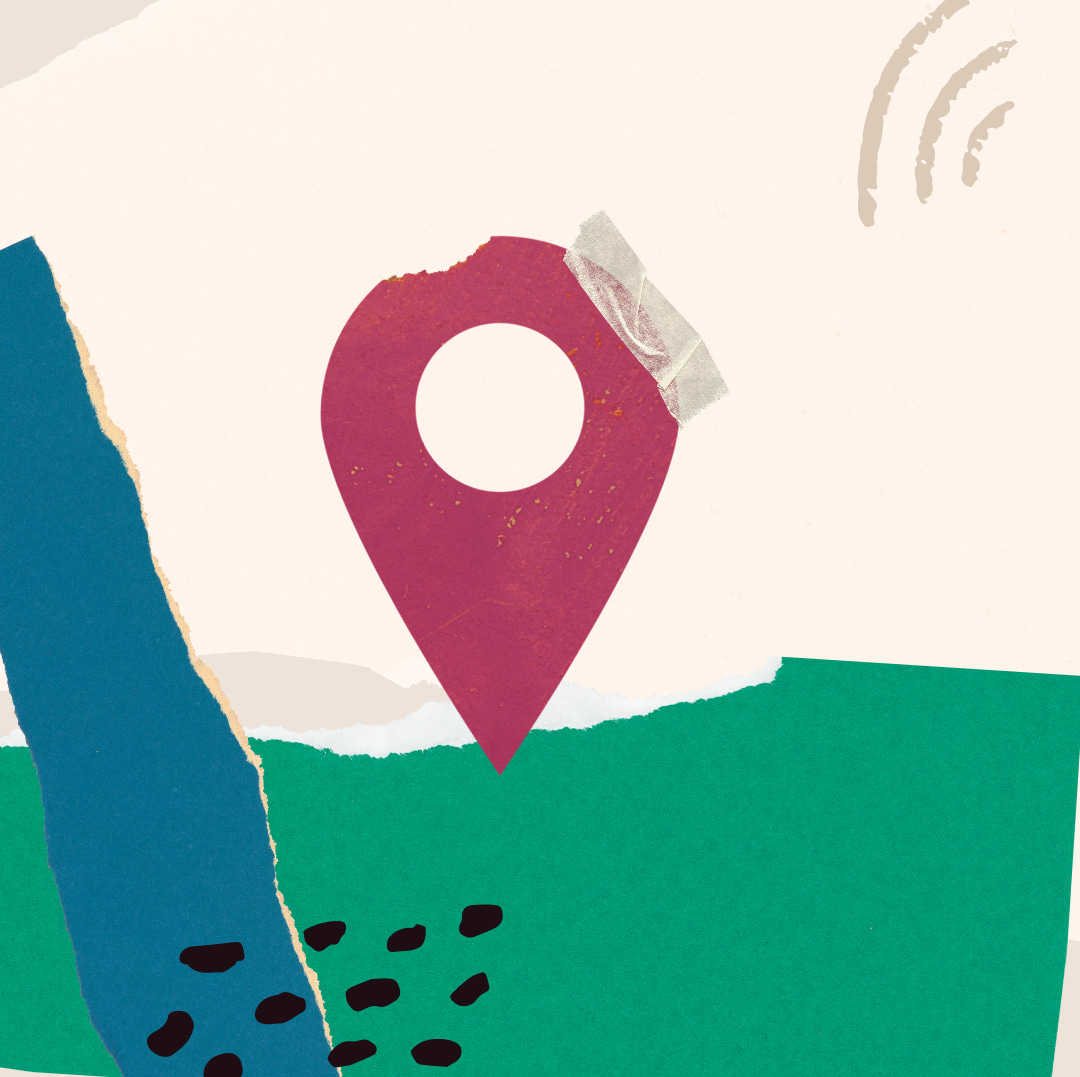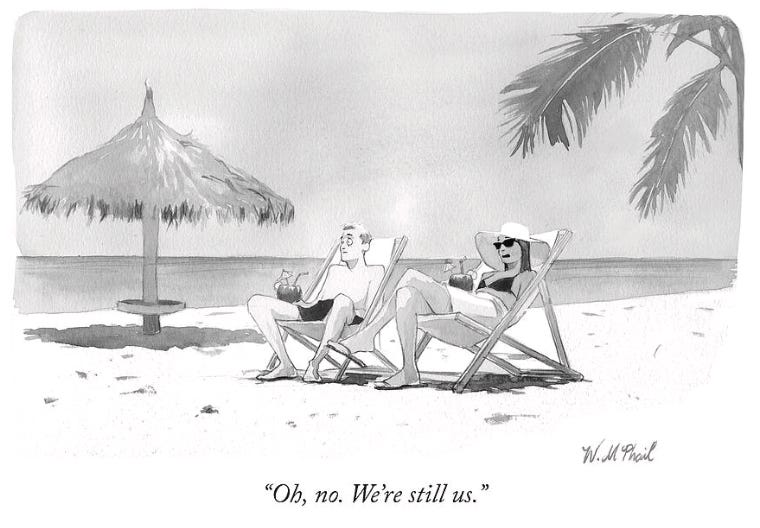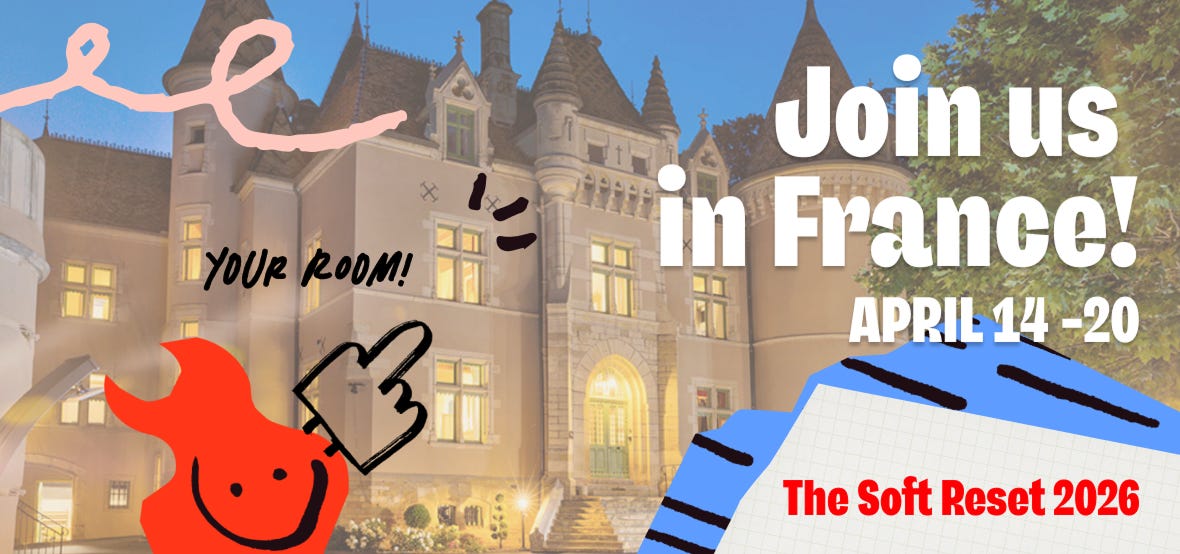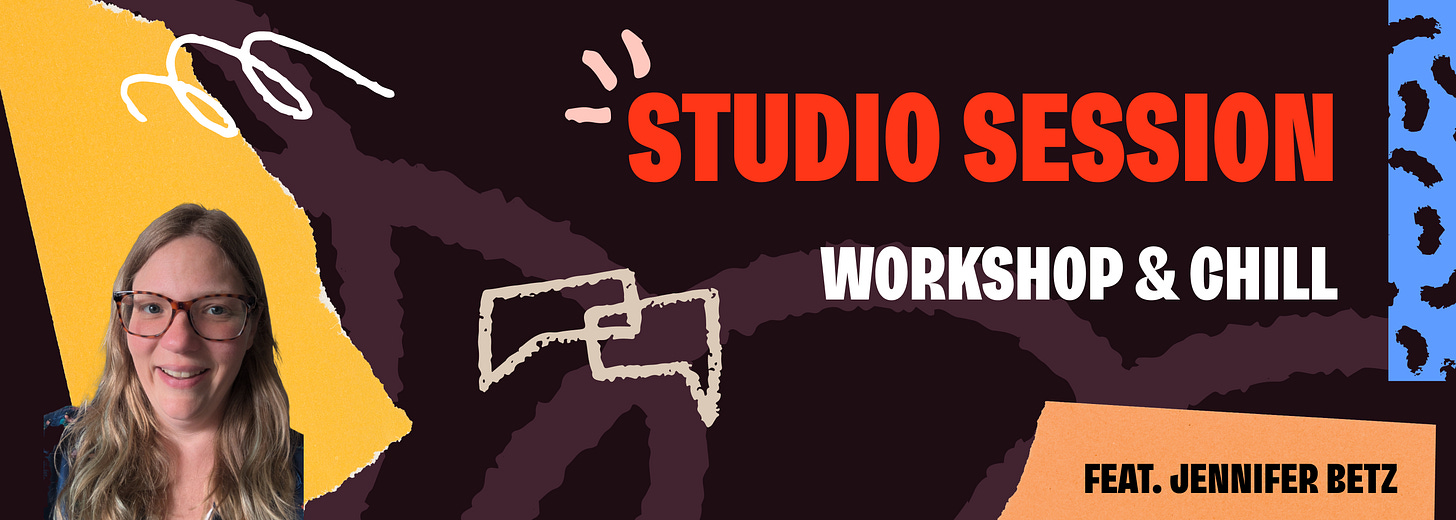Wherever you go, there you are
Why getting what we’re chasing isn’t always satisfying
Hi there! You’re reading the Bonfire newsletter from Kevan Lee & Shannon Deep. Each week, we highlight brand, marketing, and creative learnings from our experience as in-house marketers turned agency owners who think a lot about creativity, our relationship to work, and how all of that impacts our identities. We’ll also feature insights from our digital community of super smart folks (which you’re welcome to join).
Wishing you a great week!
Jon Kabat-Zinn is a celebrated mindfulness teacher, retired professor, and founder of clinics at the University of Massachusetts researching stress reduction and mindfulness as a medical practice. He’s also the author of a bunch of books you might have heard of, one of which is titled:
Wherever You Go, There You Are
Damn, Jon. You didn’t have to come for us and our vision boards like that.
This phrase also has about a million permutations if you give it a quick Google, and its original origins may even be Confucius, Seneca, or Heraclitus.
Or maybe it’s just one of those truths of human nature that we’re obliged to learn about ourselves again and again.
While the phrase may at first glance have the mind-puzzle vagueness of a Zen koan, “Wherever you go, there you are” is actually quite straightforward when you put it another way:
You can’t escape yourself.
That’s actually the good news…and the bad news as well.
It’s good news because we can intentionally work on creating an internal safe harbor that no one and nothing external can compromise.
The bad news is that most of us instead look to those external things in order to change our inner state.
We chase feelings, forgetting that the call is always coming from inside the house.
The problem with chasing feelings
Those of us who grew up in or have since been inculcated with Western business culture are more than a little obsessed with goals and productivity. We have personal goals and professional goals. We have 5-year plans and vision boards and New Year’s resolutions and fitness regimes.
We do all this because we believe that achieving the goal will transform us in some way—and that transformation will change how we feel about ourselves and our lives. Now, we will be proud of ourselves. Or we will be more stable, more peaceful, more wealthy, finally recognized for our contributions, or at last pleased with our physical appearance or level of career attainment.
In short, once we achieve X, we will feel Y—and Y is whatever emotion we’ve been longing to feel!
But we forget that even when we achieve X, escape Y, or become Z, we are still, crucially, subject to the same emotions we’ve always been.
This is one of my favorite New Yorker cartoons, by the incredible Will McPhail:
Wherever you go—whether it’s a tropical beach, the top rung of the career ladder, the altar, your dream masters program, or the gym—there you are.
Oh, no.
We’ve talked before about how bad humans are at predicting how they will feel in the future. Today, we might feel overwhelmed, anxious, unworthy, inadequate, lonely, disrespected, or any number of nominally negative emotions. And so we set explicit and implicit goals in order to rectify those “bad” feelings.
Except the you who felt incapable is still the you who gets the big promotion. The you who felt lonely is still the you who gets married. And the pesky thing about feelings is that they very rarely listen to our rational explanations of why they should and shouldn’t exist, because we don’t really control them, per se. We control our response to emotions and our behavior, we can mask them, ignore them, or suppress them, but we can’t sit and just will ourselves, apropos of nothing, to feel genuine joy or anger or sadness. (And no, purposely thinking about the beginning of Up isn’t the same as willing yourself to feel sad! Nice try.)
A relevant thought experiment: Let’s say you feel unworthy today, and you’re given the following choice:
Work for the next 10 years on an incredibly ambitious and risky project that will consume your free time and cause immense stress and personal struggle, but you believe at the end of it, you’ll have solved your unworthiness problem
Take a pill that erases all feelings of unworthiness for the rest of your life
I think most of us would choose the pill, no?
(And if that’s not an easy choice for you, is it because you believe that you need to earn your feeling of worthiness? As in, you believe that you are not ever inherently worthy without achievement? And by whose standards again? Hmm…)
When we break it down like this, we can see that what we really want are the feelings, not the things we believe will create the feelings. And while we aspire to make progress in order to feel different, we (humans) are bad at predicting what will give us the “right” feelings, which means we’re all just kind of flailing around, never really getting at the root of the problem.
Reservations are OPEN for The Soft Reset 2026. Learn more and grab your spot here!
The problem with letting negativity drive
Sometimes, I hear people express the idea that without a feeling of unworthiness, anxiety, etc., they’re afraid they wouldn’t go after anything at all! They’re attached to the idea that their inner critic, existential dread, or quest for social vengeance is the only thing between them and a selfish, meaningless life of eating chips and watching trash TV. Like, if they aren’t afraid of feeling bad, then what’s even the motivation to create a beautiful life for themselves?!?!
Sorry...um? Is getting to live a beautiful life not the motivation for creating a beautiful life?
To me, this is like filling up your car’s gas tank with used fryer grease and expired hard boiled eggs and thinking that’s the best way to make it to your destination. You might be able to drive…for a little while. But it’s gonna stink in there and probably ruin your engine!
What would our ambition actually look like if we nurtured it from a place of positivity, peace, and abundance? What if we already had the feelings we were chasing?
Wouldn’t a beautiful life be more possible once you release the idea that your negative feelings are the necessary engine for getting you there? It’s an (understandable) failure of the Western-encoded imagination to believe that if you give yourself love, grace, and acceptance, not only would you suddenly turn into a despicable lump, but that you’d even give a shit about chasing all the things you wanted to in the first place.
We can easily imagine what we want to achieve from a place of fear and lack and scarcity. We’ve been conditioned to imagine the external things we can create or consume to fill up the holes and plug the gaps. And we’ve been conditioned because, in their worst incarnations, political, economic, and religious systems concentrate and hoard power and resources.
In other words, it’s not good for capitalism if you believe you can be fulfilled without climbing the career ladder or starting your own business, buying the newer car and the bigger house and getting married and having 2.5 kids. It’s not good for authoritarianism, which relies on scapegoating and divisive rhetoric, if you believe that everyone—including you!—deserves certain rights, liberties, and dignities no matter what “value” they “produce.” And it’s not good for religion if you believe you can and should be a moral person even without the motivations of reward or punishment in the afterlife.
I’m not saying there’s a literal evil cabal making explicit plans to sow propaganda and crush resistance to these systems. (I’m not down some Lizard People rabbit hole over here!) I’m just pointing out that systems gonna do what systems gonna do. They are designed to self-perpetuate by establishing norms that incentivize compliance to the system. So change is hard. Resistance withers because its resources—money, participants’ time, beneficiaries’ incentives—are already tied up in the system, or the resistance is co-opted by the system…which upholds the system!
The (actual) root of the problem
If you’re chasing something in order to produce a feeling, whether you know that’s what you’re doing or not, there are no guarantees you get and keep that feeling once you’ve gotten what you were after.
We talked earlier about how chasing achievement doesn’t address the root problem, which I believe is this: Non-acceptance of all feelings.
It seems intuitive to say that feeling bad = bad. Feeling bad = try to not feel bad. But what we resist persists. And since feelings aren’t something you control anyway, you’re essentially just pirate-swinging from boat to boat in a constant storm, hoping that one boat will be a little comfier, one a little more waterproofed, one less creaky.
But you’ll get tumbled less violently if you just dive under the waves.
When we allow ourselves to sit with the negative emotions, when we accept them as a part of having the full human experience, when we get curious about where they came from, intrigued by what they’re trying to tell us we need more or less of, they’re no longer a problem to solve by going out and doing X or becoming Y in the hopes of never feeling them again.
Because the goal can’t be No Bad Feelings Ever. You know when there are No Bad Feelings Ever? Yeah: 💀🪦💀
In doing this, in allowing room for the “bad” feelings rather than shutting them in a closet or chasing the thing we think will exterminate them, we discover just how roomy and varied we are inside. We become meteorologists of our own internal weather. But meteorologists don’t control the weather.
Wherever you go, there you are. You’re still you in any weather. And you get to decide what happens when it storms.
Over to you…
Do you relate? What are your strategies for becoming more aware of what you’re feeling, positive or negative?
Events, resources, and more
Resources 🛠️
A quote and a prompt: In our Ask & Share channel, Campout member Nadeen Kharputly shared this quote from Joan Didion’s “On Keeping a Notebook”:
“I think we are well advised to keep on nodding terms with the people we used to be, whether we find them attractive company or not.”
Inspired by this quote, Nadeen crafted a journaling prompt for herself: Write a sentence or two to describe who you were at different points in your life.
Let us know if you try it!
Brand marketing courses & templates - In our Gumroad storefront
From AI search optimization to brand reach tracking and personal positioning, get our detailed how-tos for a couple bucks each.
Campout Events 🗓️
Studio Session: Workshop & Chill - Campout members only
Ever wish you could get in a room with other creative minds and actually work on something together? Not just talk about it, but roll up your sleeves and make it better?
That’s exactly what we’re doing in this Studio Session on Wednesday, November 19 @ 12pm Eastern.
Campout member Jennifer is bringing a real project she’s working on, and we’re going to workshop it together. Come dig in with us!
But wait! There’s more…
Wanna hang out?
Reservations are OPEN for our next retreat in April 2026! Come chill in the French countryside while you explore your values, your inspiration, and your love of fine cheeses.
Wanna be friends?
If you love this newsletter and wish it were more interactive, you’re in luck! Join us over in Campout, our digital community for creative marketers and the creative curious.
Wanna work with us?
If you need help with brand strategy and storytelling, fractional brand and marketing leadership, and bringing your brand strategy to life in impactful ways, send us an email at hello@aroundthebonfire.com to get in touch.
As always, you can find us on LinkedIn, Instagram, and Threads.







